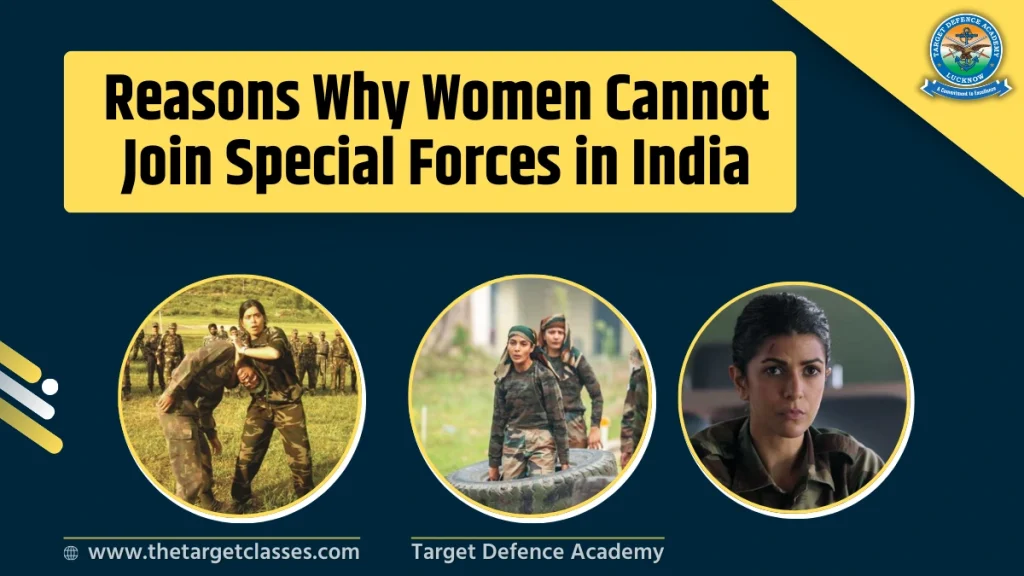The debate on women in fighter roles, especially in India’s elite Special Forces such as Para (SF), Marcos, and Garuda commands, is gaining momentum. While women have made significant advances in the armed forces – to serve as fighter pilots, medical officers, and ground troops – their entry into Special Forces is prohibited. This is not due to a lack of capacity, but due to operations, logical, and politically driven challenges. In this article, we are able to break down the six primary reasons why women cannot currently join Special Forces in India, whilst also exploring the evolving dynamics of gender integration in the military.
1. Physical Endurance Requirements
Special Forces operatives undergo some of the toughest training regimens in the world. This includes:
- Carrying 30-40 kg of load across long terrains.
- Enduring sleep deprivation, extreme weather, and survival drills.
- High-altitude and underwater combat training.
While many ladies are incredibly fit, the organic variations in muscle density, patience, and restoration rates pose demanding situations in assembling uniform standards applied to male counterparts. The military operates on unit strength, not individual exceptions, making uniform benchmarks non-negotiable.

2. Operational Deployments in Hostile Environments
Special Forces are deployed in frontline battle zones, frequently in the back of enemy lines, wherein missions can last days or perhaps weeks in severe isolation.
- Lack of basic hygiene facilities.
- No separate arrangements for women in remote forward posts.
- Close living conditions in all-male squads.
These operational realities make the integration of women logistically complex at present.
3. Cultural and Social Challenges
India’s military environment is deeply rooted in traditional and cultural setups.
- The presence of women in close-quarter combat units may lead to social sensitivities and even morale issues within teams.
- Concerns about the safety and dignity of women soldiers if captured by hostile forces further complicate the matter.
4. Risk of Capture and Treatment by Enemy Forces
One of the biggest concerns is the risk of women operatives being captured during missions.
- Women soldiers may face harsher treatment, including gender-based violence, which adds additional psychological and diplomatic risks.
- This makes policymakers cautious about deploying women in such ultra-sensitive missions.
5. Psychological Impact on Units
Special Forces operate on brotherhood, trust, and seamless integration.
- If a woman is injured or captured, the protective instinct among male operatives could compromise mission objectives.
- This psychological factor, though not openly discussed, plays a major role in policy decisions.
6. Policy and Doctrinal Limitations
Currently, Indian defence policies do not allow women in Special Forces roles.
- Women officers are allowed in combat-help and selective combat roles (e.g, fighter pilots, artillery, army police).
- The doctrine for Special Forces is based on all-male units, with no restructuring carried out to include girls.
The Road Ahead: Can This Change?
Globally, many countries like the USA, UK, and Israel have opened combat and special operations roles to women, though with limited numbers. In India:
- Women are now inducted permanently as fighter pilots.
- They serve in combat support roles across the Army, Navy, and Air Force.
- With evolving mindsets and technological advancements, the door may open in the future.
- Training of Para Special Forces Operatives – India’s Elite Commandos Revealed
- Ways to Join COBRA Commandos
- 5 Most Used Weapons by Indian Special Forces
- Rudra Brigade and Bhairav Commando Units – Indian Army’s Agile Strike Forces
Conclusion
In India’s armed forces, women have already proven their courage, ability, and leadership. When it comes to Special Forces, however, limitations are based on practical rather than gender bias. The six reasons discussed — from physical standards to policy limitations — highlight why women are currently not part of these elite units.
That said, with evolving defence reforms and global examples, the future may see Indian women breaking yet another barrier — serving in the Para SF, MARCOS, and Garud Commandos.
FAQs for 6 Reasons Why Women Cannot Join Special Forces in India
Ans. Due to the extreme physical endurance standards set for commandos.
Ans. Yes, it demands 24×7 rugged living under harsh conditions.
Ans. Yes, as covert deployments require unpredictable and prolonged isolation.
Ans. Yes, the lack of separate facilities in remote hostile zones limits feasibility.
Ans. Yes, deep-rooted mindsets resist women in direct combat roles.
Ans. Yes, high-casualty, high-risk missions make induction a debated issue

